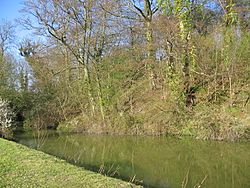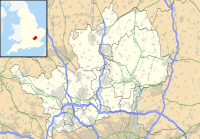Anstey Castle facts for kids
Quick facts for kids Anstey Castle |
|
|---|---|
| Anstey, Hertfordshire, England | |
 |
|
| Coordinates | 51°58′40″N 0°02′34″E / 51.97773°N 0.04276°E |
| Site information | |
| Condition | Earthworks only |
Anstey Castle was once a strong fortress in the village of Anstey, Hertfordshire. It was a special type of castle called a "motte and bailey" castle. This means it had a large earth mound (the motte) with a tower on top, and a walled courtyard (the bailey) below.
People believe that Eustace II, Count of Boulogne, or someone from his family, first built this earthwork castle. It was likely already standing when a powerful lord named Geoffrey de Mandeville took over the land. He wanted to make his estate in the area even stronger.
Contents
Anstey Castle: A Look Back
What Was Anstey Castle?
Anstey Castle was a stone fortress built in the 1100s. It was designed to protect the area and its owners. The motte and bailey design was common for castles built around that time.
Who Owned Anstey Castle?
Around the mid-1100s, the castle became the property of the de Anstey family. During a big conflict called the First Barons' War (1215–1216), Nicholas de Anstey owned the castle. He was on the side of the barons, who were fighting against King John.
The Castle's Demise
After the war ended, King John ordered Nicholas de Anstey to destroy parts of the castle in 1218. Only the sections built before the war were allowed to remain. The materials from the demolished parts were used to fix the nearby church. You can even see the castle's crest and shield in the church's old drawings!
When Nicholas de Anstey passed away in 1225, his daughter was still very young. Because of this, the king took control of the castle and the land. He gave it to William Fitz Baldwin, who then passed it to Robert de Rokele. Robert was meant to look after it for the Archbishop of Canterbury, a very important church leader.
The castle was still called a "castle" in records from 1304. However, by 1314, it was only referred to as a "manor." This means it was no longer seen as a strong fortress.
What Remains of Anstey Castle Today?
Exploring the Ruins
Today, you can still see the remains of Anstey Castle. The large motte, or mound, is about 27 feet (8.2 meters) high. It measures about 75 by 65 meters (246 by 213 feet). A ditch filled with water, about 10 meters (33 feet) wide, surrounds the motte.
To the north and east, the bailey (the old courtyard area) is surrounded by a dry ditch. There's also another large mound at the site. People tried to dig up and explore these remains in 1902–1903. However, their findings about when the castle was built were not very clear.
 | Emma Amos |
 | Edward Mitchell Bannister |
 | Larry D. Alexander |
 | Ernie Barnes |


